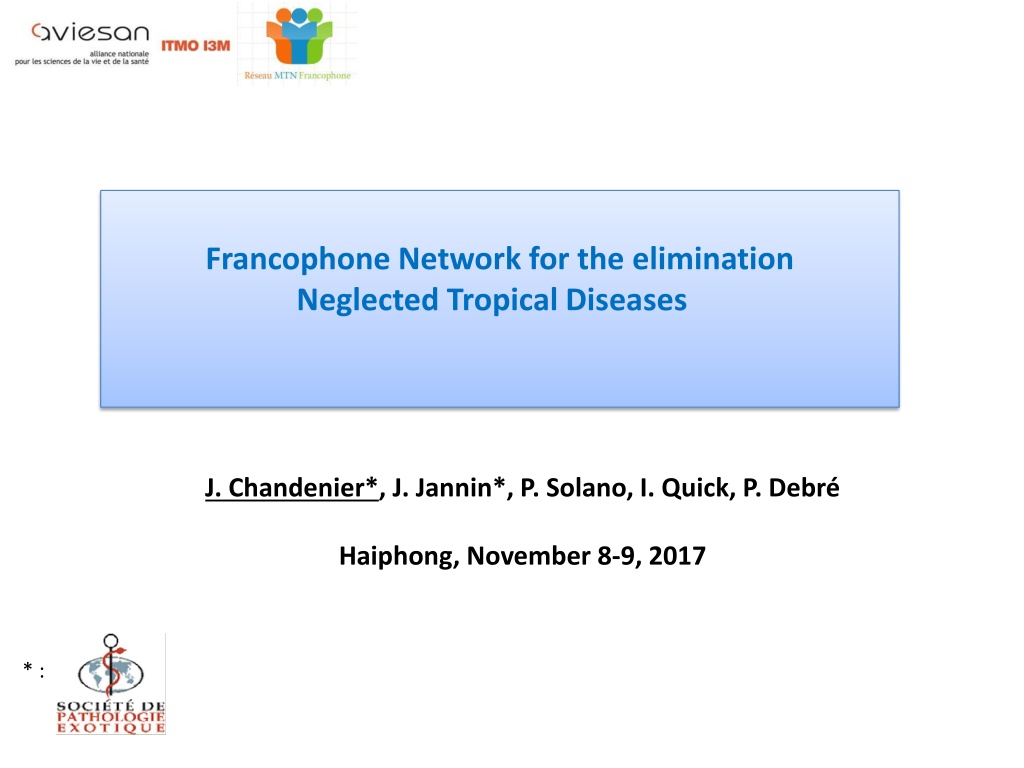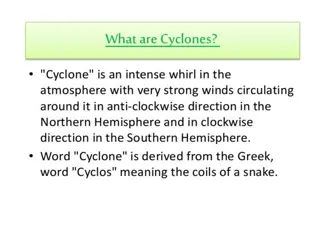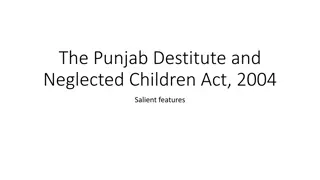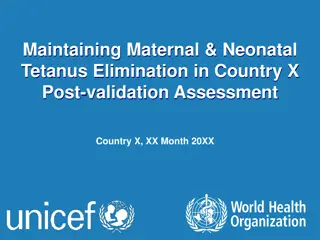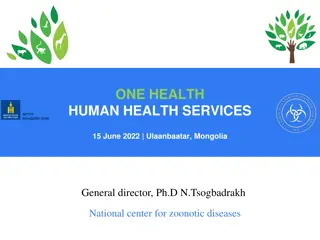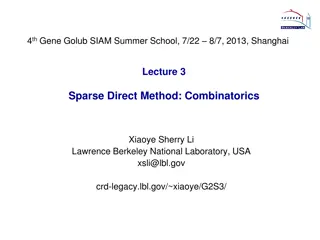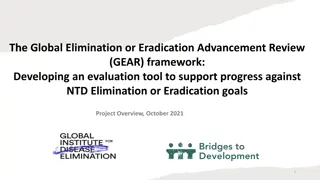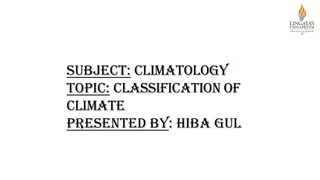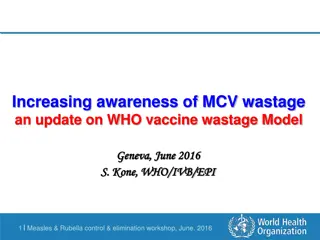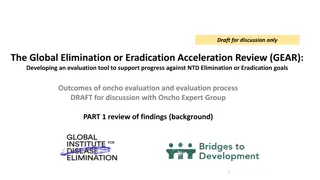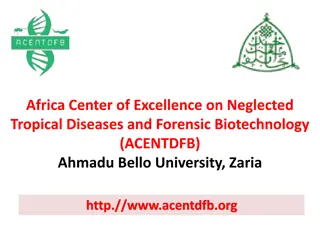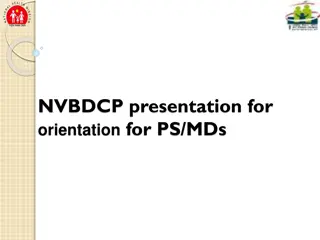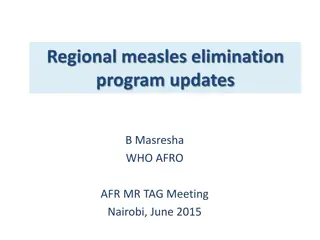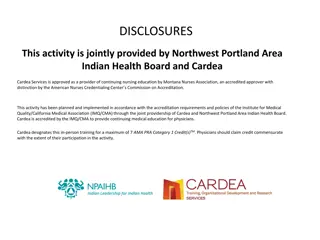Francophone Network for the Elimination of Neglected Tropical Diseases Conference Overview
Explore the challenges and characteristics of Neglected Tropical Diseases (NTDs) discussed at the Francophone Network conference. Learn about the global interest, impact on populations, and initiatives to combat NTDs through existing solutions and international collaborations.
Uploaded on Nov 26, 2024 | 0 Views
Download Presentation

Please find below an Image/Link to download the presentation.
The content on the website is provided AS IS for your information and personal use only. It may not be sold, licensed, or shared on other websites without obtaining consent from the author. Download presentation by click this link. If you encounter any issues during the download, it is possible that the publisher has removed the file from their server.
E N D
Presentation Transcript
Francophone Network for the elimination Neglected Tropical Diseases J. Chandenier*, J. Jannin*, P. Solano, I. Quick, P. Debr Haiphong, November 8-9, 2017 * :
Problem of neglected tropical diseases (NTDs) - late 20th century, global interest in major infectious diseases in tropical areas: malaria, HIV, tuberculosis - 21th century, interest in diseases of the "epidemiological transition" in tropical zones: overload, cardiovascular pathologies, oncology, ... - but, late 20th century and 21st century, persistence of NTDs
Characteristics of neglected tropical diseases (NTDs) - Affect the poorly visible and poorly audible populations - Diseases traveling little or no outside the tropics (climate, vectors, ...) - Often cause stigma and discrimination - Have a significant impact on morbidity and mortality - Are neglected by research - But: could be controlled, prevented and possibly eliminated using existing solutions
Neglected Tropical Diseases (NTDs) Diseases (updated April 2017): Parasitic/fungal - Chagas disease - sleeping sickness - dracunculiasis - lymphatic filariasis - onchocerciasis - echinococcosis - foodborn trematodiasis - schistosomiasis - soil-transmitted helminthes - taeniasis/cysticercosis - scabies - mycetomas/chromomycosis Bact riennes - Buruli ulcer - leprosy - yaws - trachoma Virales - dengue/chikungunya - rabies Other - snakebite
Setting up of the reaction against the NTDs - July 2005, creation of the Department of fight against Neglected Tropical Diseases - January 2012, roadmap for implementation Dr Margaret Chan - London declaration 2013 - 2015 : NTDs included in the Sustainable Development Goals (SDGs) 2030
Setting up of the French reaction G7 Summit, Ise-Shima, Japan, 2016 G7 Summit, Elmau, Germany, 2015 > 250 registered so far: - Institutions - Individuals - Associations - NGO - Learned Societies - Montpellier (France), april, 2016
Scientific and Strategic Council of the NTDFN IRD Philippe Solano CIRAD Pascal Bonnet INSERM Laurent Marsollier PASTEUR INSTITUTE Philippe Bastin NGO Serge Resnikoff (OPC) Eric Pichard (Sant Sud) South country Crispin Lumbala F lix Boa Yapo Roch Dabir M rieux Fondation S bastien Quesney Training / learned societies Jacques Chandenier PARAFRAP Fr d ric Bringaud DNDi Nathalie Strub Wourgaft SANOFI Fran ois Bompart Various Jean Jannin Robert Sebbag willingness to make changes in the overall policy and action strategies of each institution about NTDs global and concerted actions to put in place for the elimination of NTDs
Questions posed by the desire to eliminate NTDs - How to adapt control strategies to each elimination context? - What new tools can be developed to ensure and sustain elimination? - How to answer all questions specific to elimination (access to care, biology, epidemiology, surveillance, ...)? - How to sustain the results acquired in a context of very low prevalence? - How to convince institutional and private donors to continue their efforts when many cases are decreasing?
Which strategy (s) for NTDs elimination Reminder: NTDs = diseases Diagnosis and/or biological Clinical (radiological) Research Medical treatments - mass - individual Cartography in all areas Interventions on the animal reservoir Vector control ELIMINATION
Which strategy (s) for NTDs training Biological diagnosis Universal access to diagnosis of NTDs Les Pensi res-Fondation M rieux Annecy (France) March 27-29, 2017 Objective: to develop a common vision of the problem of universal access to the diagnosis of NTDs for the poorest populations
Which strategy (s) for NTDs training Universal access to diagnosis of NTDs Les Pensi res-Fondation M rieux Annecy (France) March 27-29, 2017 Conclusions : - Universal access to diagnosis is an absolute condition for the success of neglected tropical disease elimination programs - universal access to diagnosis is conceived from 4 major themes: The 4 elements form a sequence. If an element is missing, access is no longer possible.
What strategy (s) for NTDs training Reminder: NTDs = diseases Diagnosis and/or biological Clinical (radiological) training Medical treatments - mass - individual Cartography multi- professional Interventions on the animal reservoir Vector control ELIMINATION
Which requirements for training in the context of NTDs? - More targeted NTDs" because current training too "general", too "diluted" in infectiology, and therefore often insufficient - In all sectors of intervention concerned (Medical / paramedical, research, technical, logistics, ...) - In all types of training involved (Academic and professionalizing, initial and continuous, central and peripheral level, ...) - In a synchronized way - Adapted to each local situation of NTDs - Supported by a local political will - Carried out by North and South stakeholders - By relying on adapted innovative techniques / methods
To act more by 2030 Join the network !! Isadora.quick@inserm.fr
